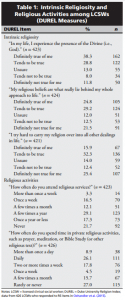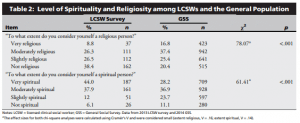A friend of this ministry, Dr. Holly Oxhandler, is Associate Dean for Research and Faculty Development and an Assistant Professor at Baylor University and one of the hosts of the CXMH Podcast. A couple of years ago, she wrote an article that was published in the Social Work academic journal, titled “The Religiosity and Spiritual Beliefs and Practices of Clinical Social Workers.”
We’ve Explored Mental Illness And Pastors
Our goal is to unite the worlds of the Church and mental health in order to better serve people who are marginalized. In a previous article about mental health, we shared about a Lifeway Research statistic about pastors and mental illness:
Pastors themselves aren’t immune from mental illness. About a quarter (23 percent) say they’ve experienced some kind of mental illness, while 12 percent say they’ve received a diagnosis for a mental health condition.
We also know from another Lifeway Research article that they believe they are serving people with disabilities well, though it is not want we in mental health inclusion ministries are seeing. This article will look at the other side of the mirror, how spiritual some mental health professionals are.
Are There Many Christian Social Workers?
The research article authored by Holly and a couple of her colleagues note that there is not a lot of research out there on the religiosity of mental health professionals, so they did their own initial study.
First, LCSWs (Licensed clinical social workers) are about half as likely as GSS (General Social Survey) respondents to identify with either of the two largest religious traditions in the United States—Protestantism and Catholicism. Second, affiliation with non-Christian groups is much higher for LCSWs (42.9 percent) than for GSS respondents (5.5 percent), with 21.6 percent of LCSWs self-identifying as Jewish. It is interesting to note that the percentage of LCSWs indicating no religious preference (20 percent) corresponds well with GSS respondents (20.7 percent).
Oxhandler, Polson, and Achenbaum. “The Religiosity and Spiritual Beliefs and Practices of Clinical Social Workers” Social Work, Volume 63, Issue 1, January 2018. p. 52. https://doi.org/10.1093/sw/swx055
The concern from this article is that if mental health professionals are not strong in their faith, this can actually hurt the treatment of those they are serving because their is a correlation of less spirituality used in sessions when they do not have a strong spiritual identity. And we know that faith actually improves outcomes in counseling. Further, within the Christian faith, we want to see the person become whole, through themselves and their identity in God.
How Churches Can Serve Professionals?
The conclusion is that mental health professionals need to be better educated about spirituality and religion. Pastors, this is a call to you. Do you know all of the Christian counselors in your area? Do you know where they go to church, how you can serve them and their agency better?
Here are a couple of ideas for you to do:
- Host a mental health Sunday where professionals can be in your lobby to start a relationship with them.
- Take these professionals out to lunch or host a soul care day for them that includes food and if you really want to serve them well, free Continuing Education Units that they need frequently through state or federal license. You can do one on spirituality and integrate mental health into it.
- Have a designated day of the month or hour of the week you pray for all of the congregation members in your community who struggle with mental illness or hidden disabilities. Ask Christian counselors to join in or ask for prayer requests. Understand they may have to be very vague due to HIPPA privacy.
- Provide a free or reduced cost respite service for counselors who have client’s with children or siblings that make it hard for clients to come to counseling.
- Establish an Employee Assistance Program or Church Assistance Program with a counseling center for people who need to get into counseling.
- Offer free spiritual direction time with counselors, spiritual retreats they can join, Bible classes/discipleship with a pastor, or other care pastors can offer to them.
These are just some ideas we have had, what other ways can pastors serve the local counseling community? Share in the comments below.
Extra Resources
I was able to get a couple of the tables from the article if you want to explore some of the responses.


